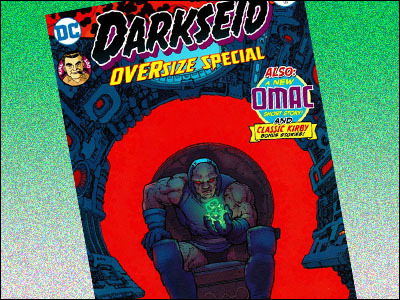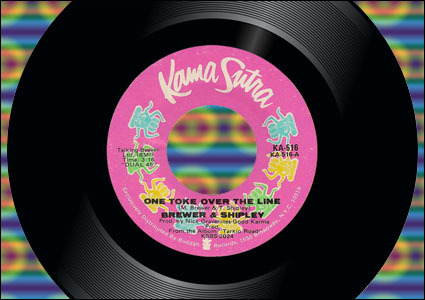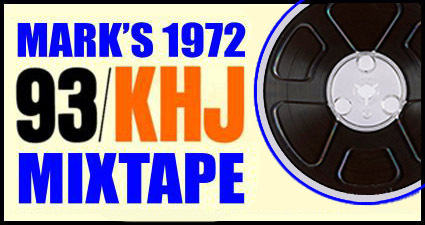Mark Evanier's Blog, page 266
January 31, 2023
Today's Video Link
Jordan Klepper is back visiting Trump rallies…only they're not really rallies. They're more like intimate conferences or some other name you give a rally when not many people show up.
No, I don't think all the folks who turn out for one of these Trump whatever-you-call-them are like the ones he selects to put on camera and into his videos. But I think it's kind of scary that there are people like that at all…
ASK me: Darkseid Special
Matt DiCarlo wrote…
Even as a reader of the blog for years, I've found you to be relatively reluctant to talk about your current work. That means that even a few years later, sometimes we don't get the same sort of stories and insight on the level of what you did in the 80s. I know you're not doing this for self-promotion but now that we're a few years away from something, like, in this case, your collaboration with Scott Kolins on the Darkseid Special.

I'm curious if you'd be willing to discuss some of the nuts and bolts of it, how you were approached, how you broke the story, what it was like to work with Mr. Kolins, if you'd been familiar with his work prior, even just how you found producing something for DC in 2017 relative to prior years, what was easier, what was harder, etc.
There's not a whole lot to tell here. An editor at DC, Jim Chadwick, called and told me they were doing a bunch of comics featuring Kirby characters and they wanted me to write one. I think I had my pick of several and I picked Darkseid. Jim lined up a Very Good Artist to draw it. I came up with a story. I ran it past Jim. He told me to proceed. I wrote the script. Before I'd even sent it in, that Very Good Artist became unavailable so Jim called and said, "I think I can get Scott Kolins to draw it."
I'd never met Scott. At least, I don't think I had. But I knew his work so I said, "Oh, he's a Very Good Artist, too." Scott drew the story. Everyone whose opinion mattered was happy with it. I didn't really collaborate with Scott since the script was done before he was on the project. I prefer to have some contact with the artist but I thought it came out fine.
See? Not a lot to tell. That's how it is with a lot of projects.
Comic-Con Memories
Unless you're reading this blog post some time after I posted this, you may notice that we're still doing some redecorating on this blog. A few pages don't work properly. A few pages look odd. All the fixing should be completed in a week or two. Or three. Or I don't-know-when. But it will get fixed.
The construction work interrupted a series of posts I was doing here of my schedules at long-ago San Diego Comic-Cons so let's resume. Here's the list of panels I was scheduled to do at the 2009 Comic-Con International. I did all the panels but who was on some of them changed.
January 30, 2023
Slip O' The Tongue
Here's an excerpt from an interview with Carl Reiner. He's talking about the decision to end The Dick Van Dyke Show in 1966. Watch it and then I want to discuss something in it…
Okay. Mr. Reiner says, referring to Dick Van Dyke, "He did Mary Poppins and Chitty Chitty Bang Bang" while he was doing the Van Dyke Show, during the summer…"
No, he didn't. After the pilot for The Dick Van Dyke Show was shot on January 19, 1961, the series went into production in June of that year and filmed its last episode on June 1 of 1966. Nobody hired Dick for a film in the summer of '61 but he shot Bye Bye Birdie during the summer hiatus in 1962, Mary Poppins and his part in What a Way To Go in 1963, The Art of Love in 1964, Lt. Robinson Crusoe in 1965 and then after The Dick Van Dyke Show finished, he took a month off and started shooting Divorce American Style.
Chitty Chitty Bang Bang began filming in June of 1967 at Pinewood Studios in the U.K. But that's an easy mistake for Mr. Reiner to make…the kind we all make, the kind you find in any interview. What it gets me to thinking about though it this: What should the interviewer do when that happens?
I do a lot of interviews, often in front of live audiences. I am helped, I'd like to think, by a good memory and the ability to throw in a name or a date when an interviewee can't remember and is grasping for it. But sometimes when they get something flat-out wrong, as Reiner did in the above video, I correct them as politely as I can…and no matter how politely I do it, it throws some people off. I can feel them tense up and they sometimes lose the thread of where they were heading.
Or sometimes, I don't correct them because I'm afraid of making them uncomfy…but then down the line, things get confusing. If there's a live audience, I can see people getting puzzled by the false information.
By the way, this is not about anyone lying. I don't even think Carl Reiner thought Dick did Chitty Chitty Bang Bang while on hiatus from the Van Dyke Show. I think he just meant to say Bye Bye Birdie and out came the wrong movie title. Happens all the time to all of us.
And I'm not asking anyone for advice on how to handle this kind of thing. Obviously, it's a matter of a case-by-case basis. Sometimes, I do correct people and sometimes, it makes the conversation flow better. And sometimes I skip it and sometimes, it makes the conversation worse. I once really pissed off an important comic book creator by correcting four or five of the kind of error Reiner made in the video. I don't have a foolproof answer for this and neither do you. I just thought I'd mention that it's something I think about.
More Toke Talk
As I expected, several readers of this blog searched newspaper archives to find out if Vice-President Spiro T. Agnew had indeed mentioned the song "One Toke Over the Line" by Brewer & Shipley in a speech on September 15, 1970. If so, we'd like to know how since the song hadn't been released then.
Well, it turns out Agnew didn't. This is from The New York Times for that date. The speech was actually the day before…
LAS VEGAS, Nev., Sept. 14 — Vice-President Agnew said tonight that American youths were being "brainwashed" into a "drug culture" by rock music, movies, books and underground newspapers. He called these part of "a depressing life style of conformity that has neither life nor style." After describing himself as a "bumpkin" earlier today in San Diego, the Vice-President came to the capital of American gambling to lecture against "creeping permissiveness" and urge the election of "square" Republicans.
Mr. Agnew said in a speech to 1,000 Republicans at the Space Center Auditorium of the Sahara Hotel that popular songs such as the Beatles' "With a Little Help From My Friends" or the Jefferson Airplane's "White Rabbit" were a message of drug use.
Ira B. Matetsky was one of the folks who looked up contemporary coverage of that speech. He found one report that Agnew also cited the songs "The Acid Queen," "Eight Miles High," "Couldn't Get High," "Don't Step on the Grass, Sam," and "Stoned Woman." No mention there either of the Brewer & Shipley record.
But Agnew gave lot of speeches. That was just about all he did while Veep apart from accepting bribes for past favors to contractors in his home state of Maryland when he was governor. He went around the country, often to fund-raisers, and explained how America was going to hell and the only way out of it was to elect people from his party. I'm sure glad no one does that these days.
It is very easy to believe that when "One Toke" was on the charts months later, Agnew mentioned it in some of his speeches. The quote from Brewer did not say Agnew had mentioned the song in the September 1970 speech. Ira found that the erroneous date on the Wikipedia page was only inserted a few days ago and unless further evidence is uncovered soon, he's going to have that date deleted there. Thanks also to Rob Davis, Bob Gillian and others who sent me links.
I was wondering if Mssrs. Brewer and Shipley are still performing. Their website, which hasn't been updated in a while still says, "Due to the Corona virus and concern for our fans' well being, as well as our own, we have canceled all shows for 2020." So they had bookings then and Jeffrey Morris sent me this link to a piece November of 2021 about them still performing so they went back to it.
I can't find anything online that they're out there now but the Brewer & Shipley page on Facebook was just update the other day with a remembrance of David Crosby, which was also featured on Tom Shipley's personal website, onetoketom.com. So at least one of those guys is blogging.
January 29, 2023
Toke Talk
We seem to be having a debate as to when the song "One Toke Over the Line" came out. I have a lot of e-mails about it but I suspect my old pal Mike Tiefenbacher has it right…
According to 45cat.com (the site to go to to determine such things for any of your future mixtape posts), "One Toke Over the Line" was issued in January, 1971. It first charted in Billboard January 30, which means it was charting locally the week of January 16th. (Like comics, the paper trade magazine cover dates are the off-sale dates, reflecting airplay dates plus the time it took to compile, publish and distribute the magazines to the newsstand; the copyright dates are two weeks prior to the chart dates).
From my personal records, it began charting in Milwaukee February 24. It peaked at #6 in Cash Box and #10 in both Billboard and Record World. One-hit wonders Brewer and Shipley issued five singles before that never charted, while three of the six issued after "Toke" charted in the Top 100, only the immediate follow-up ("Tarkio Road") hitting the top 40 (#39) in Cash Box. The album which included "Toke" ("Tarkio") came out in November of 1970 but only made the charts after "Toke" became a hit in March.

In other words, if Spiro actually made that speech in September of 1970, he was either psychically prescient, or he never mentioned this song. Or that speech came in September of '71. (It's Wikipedia, after all. Every fact has a 50% chance of being right or wrong.)
The Lawrence Welk Show is still shown every Saturday on PBS affiliates in Minnesota and Wisconsin, and I suspect it has been on PBS continuously since the late '80s, though that's only from distant observation and a memory that's become less dependable every year.
Obviously, the most likely explanation here is that the date cited for Agnew's speech is wrong in Wikipedia. Agnew gave a lot of those speeches and someone may have gotten confused as to which speech mentioned the Brewer & Shipley tune. We may find out for sure if/when one of my readers with access to old newspaper databases checks it out.
Incidentally, in the many years of this blog, I have occasionally referred to some recording artist or act as a "one-hit wonder." With the exception of the group Yellow Balloon, that always brings some very angry mail from fans of the recording artist(s) insisting they were not that. So folks, please note that Mike said that. I didn't.
Great V.O. Advice (Not From me)
I know a lot of folks who come to this site aspire to work as voiceover actors, especially for animation. I have a limited amount of advice in that area…but you know who has a lot? Bob Bergen. Bob is one of the most in-demand, works-all-the-time people in that field and only part of that is because he's really good in front of a microphone. He also understands the business — and understands it is a business — and he teaches and gives excellent advice. From time to time, he posts invaluable tips on his Instagram page and you oughta be reading them.
In fact, if you want to be an actor of any kind, follow this man. And some of what he says might even be of value to wanna-be writers, artists, poets, directors…really any creative endeavor.
Mark's 93/KHJ 1972 MixTape #44
 The beginning of this series can be read here.
The beginning of this series can be read here.Here's another song that I had on my becoming-infamous mixtape but I never knew anything about the song or the folks who'd recorded it. The folks were Mike Brewer and Tom Shipley and they were reportedly in a coffee shop somewhere when they got the idea for "One Toke Over the Line," which Wikipedia says came out in 1971 but then on the same page, they also say — and I quote…
On September 15, 1970, Vice President Spiro Agnew gave a televised speech condemning songs that contained references to drugs. Among the songs he mentioned were "With a Little Help from My Friends" by the Beatles, "White Rabbit" by Jefferson Airplane, and "One Toke Over the Line."
…and The Great and All-Knowing Wikipedia further states that Agnew's speech caused a lot of radio stations to stop playing that kind of song. Agnew, of course, was an outspoken defender of morals when he wasn't taking bribes.
Here are Brewer and Shipley performing the song as per their record. To further confuse its date of issue, this clip is from a 1973 episode of Midnight Special and it displays a copyright date of 1971…
Wikipedia also gives us this quote from Mike Brewer…
The Vice President of the United States, Spiro Agnew, named us personally as a subversive to American youth, but at exactly the same time Lawrence Welk performed the crazy thing and introduced it as a gospel song. That shows how absurd it really is. Of course, we got more publicity than we could have paid for.
We were just talking on this blog about Lawrence Welk and I have been informed by quite a few e-mailers that Lawrence Welk Show reruns are on one of their local stations — usually PBS stations apparently.
My pal Pat O'Neill also reminded me of that performance on Mr. Welk's program once — one of Welk's awkward attempts to be "contemporary" which I featured on this blog way back on this page in 2009. I'll save you the trouble of clicking on it by embedding it again here. Welk did not introduce it as a gospel song. At the end though, he said (as you can hear) that it was a "modern spiritual." In any case, this is how this song oughta be sung…
January 28, 2023
Today's Video Link
If you ask someone versed in TV history to name the longest-running programs, they'll probably forget about The Lawrence Welk Show, which began on local TV in Los Angeles in 1951 and, through a maze of syndication and network deals, managed to produce new programs until 1982. And that wasn't the end of it because it lived on in reruns for a long time and may still, for all I know, be on somewhere. None of those episodes would probably look any more dated today than when they were first broadcast. The show always looked like a relic of the past.
Mr. Welk was a bandleader and showman and a very awkward host who never got any better at it. He was, like Ed Sullivan, one of those guys who started in television when most hosts looked stiff and not terribly articulate…then stayed around as more professional people moved into the medium. His on-air malaprops were legendary but much of America found him and his show delightful
Once in a while, Welk would dance — ballroom style — with one of the many dancers he had on his program or with a lady from the audience. Once in a while, he'd play the accordion. It was his specialty but he usually left the real accordion-playing to a gent named Myron Floren who is the soloist featured in our clip today.
I remember watching the show with my parents — which is to say, they had it on and I was on the living room floor in front of the TV reading comic books. And I remember that Welk often featured polka numbers on his show…though not as many as Dick Sinclair's Polka Parade, a similar series with a more polished host and all-polkas, all the time. It seemed like one out of every three polkas on the Welk show was "The Pennsylvania Polka."
Here then is "The Pennsylvania Polka" as performed endlessly on The Lawrence Welk Show. You get a fast glimpse of Mr. Welk before he turns the floor over to his singers and dancers plus Mr. Floren. The word was that the performers on his show were paid as little money as Welk could get away with paying, which may seem difficult to believe. They always looked so happy…
January 27, 2023
Today's Video Link
Johnny Carson and Don Rickles. From January 12, 1989…
Mark Evanier's Blog
- Mark Evanier's profile
- 47 followers




